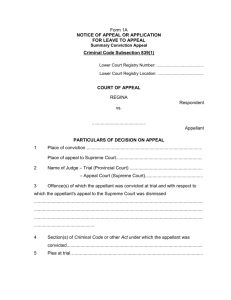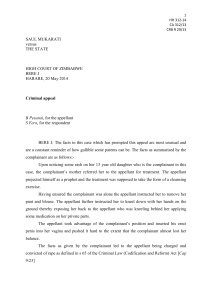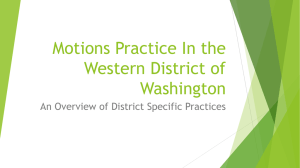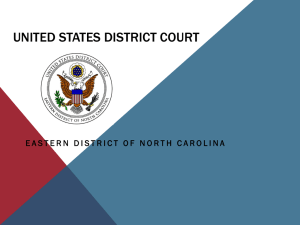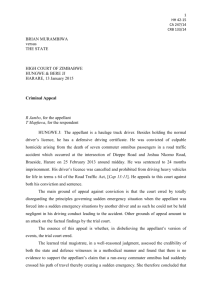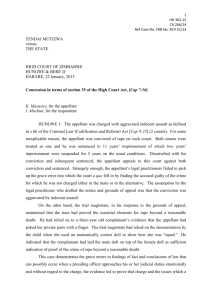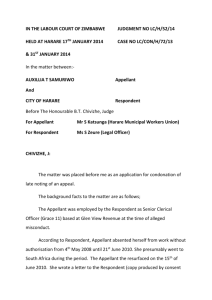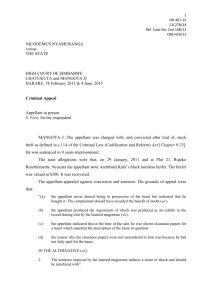KOMAKECH NESTORE VS UGANDA
advertisement
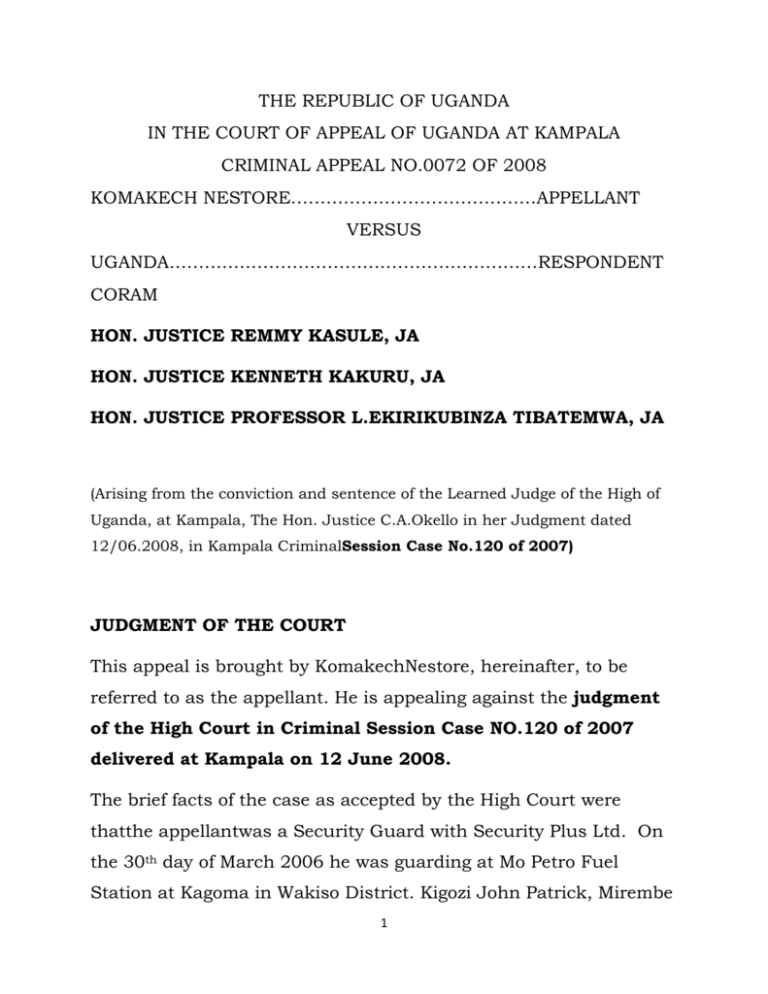
THE REPUBLIC OF UGANDA IN THE COURT OF APPEAL OF UGANDA AT KAMPALA CRIMINAL APPEAL NO.0072 OF 2008 KOMAKECH NESTORE……………………………………APPELLANT VERSUS UGANDA………………………………………………………RESPONDENT CORAM HON. JUSTICE REMMY KASULE, JA HON. JUSTICE KENNETH KAKURU, JA HON. JUSTICE PROFESSOR L.EKIRIKUBINZA TIBATEMWA, JA (Arising from the conviction and sentence of the Learned Judge of the High of Uganda, at Kampala, The Hon. Justice C.A.Okello in her Judgment dated 12/06.2008, in Kampala CriminalSession Case No.120 of 2007) JUDGMENT OF THE COURT This appeal is brought by KomakechNestore, hereinafter, to be referred to as the appellant. He is appealing against the judgment of the High Court in Criminal Session Case NO.120 of 2007 delivered at Kampala on 12 June 2008. The brief facts of the case as accepted by the High Court were thatthe appellantwas a Security Guard with Security Plus Ltd. On the 30th day of March 2006 he was guarding at Mo Petro Fuel Station at Kagoma in Wakiso District. Kigozi John Patrick, Mirembe 1 Douglas and Byabasaija Andrew were pump attendants at the said Station and were present, having been on night shift on that day.At around11:00 p.m. while Kigozi and Byabasaija were counting money, the appellant put them on gun point and robbed them of the money accumulated from the day’s sales. During the scuffle the appellant fired a bullet which hit KIGOZI thereby injuring him around the bladder. The appellant escaped from the scene with the said money before he could be arrested. Following the day of the incident the appellant absconded from duty until his supervisor looked for him and found him at his home. The rifle that the appellant used was found abandoned at the scene of the robbery and was recovered by the police. When theappellant’shouse was searched Uganda Shilling1, 258,000/= was recovered from him as part of the money he had robbed. The appellant was arrested and taken to Kawempe Police Station where he was charged with robbery contrary to Sections 285 and 286 of the Penal Code Act. For ease of reference we reproduce the said sections of the Code here below: Section 285: Definition of Robbery: Any person who steals anything and at or immediately before or immediately after the time of stealing it uses or threatens to use actual violence to any person or property in order to obtain the thing 2 stolen or to prevent or overcome resistance to its being stolen or retained commits the felony termed robbery. Section 286: Punishment for Robbery (1) Any person who commits the felony of robbery is liable (a) On conviction by a magistrate’s court, to imprisonment for ten years; (b) On conviction by the High Court, to imprisonment for life. (2) Notwithstanding subsection (1) (b), where at the time of, or immediately before, or immediately after the time of the robbery, an offender uses or threatens to use a deadly weapon or causes death or grievous harm to any person, such offender and any other person jointly concerned in committing such robbery shall, on conviction by the High Court, be sentenced to death. (3) In subsection (2), “deadly weapon” includes any instrument made or adapted for shooting, stabbing or cutting and any instrument which, when used for offensive purposes, is likely to cause death. (4) Notwithstanding section 126 of the Trial on Indictment Act, where a person is convicted of the felony of robbery the court shall, unless the offender is sentenced to death, order the person convicted to pay such sum by the way of compensation to any person to the prejudice of whom the robbery was committed, as in the opinion of the court is just having regard to the injury or loss suffered by such person, and any such order shall be deemed to be a decree and may be executed in the manner provided by the Civil Procedure Act. 3 According to the Indictment,the appellant was charged with 3 Counts of Robbery and in essence the particulars of the offence were that he had, while armed with agun, robbed money and at or immediately before or immediately after the theft threatened to use a deadly weapon to wit SAR rifle on Kigozi John Patrick; Mirembe Douglas and Byabasaija Andrew. At the end of the Prosecution Case, the Trial Judge ruled that no prima facie casehad been made outagainst the appellant on Counts 2 and 3 (involving Mirembe Douglas and Byabasaija Andrew) as victims. As a consequence, the appellant was acquitted ofthe charges in Counts 2 and 3. Court however made a finding that a prima facie case of robbery had been made out against the appellantin Count 1 where Kigozi John Patrick was the victim. The appellant was thus put on his defence. In its Judgment, the Trial Court found that all the essential ingredients of the offence of robbery had been proved beyond reasonable doubtand thus convicted the accused of Robbery contrary to Sections 285 and 286 of the Penal Code Act.He was sentenced to 14 years imprisonment.The appellant lodged this appeal against conviction and sentence. At the appeal the appellant was represented by Mr. Andrew Sebuggwawo on State brief. The State was represented by Ms. SamalieWakooli, Senior State Attorney in the Directorate of Public Prosecution. 4 According to the Memorandum of Appeal, the appeal was based on the following grounds: i) The learned trial judge erred in law and fact when she based her conviction on insufficient and unsatisfactory prosecution evidence. ii) The learned trial judge grossly erred in law when she conducted sentencing proceedings without accused’s legal counsel. iii) The learned trial judge grossly erred in law when she convicted the appellant of aggravated robbery instead of simple robbery. iv) The learned trial judge grossly erred in law and fact when she sentenced the appellant to 14 years imprisonment a sentence that is manifestly excessive in the circumstances. However, at the hearing of theAppeal Counsel for the appellant dropped Grounds 1 and 3 and only arguedgrounds 2 and 4. In essence the appeal did not challenge the conviction of the appellant for the offence of Robbery contrary to Sections 285 and 286 of the Penal Code Act. What was challenged was the process of sentencing and the consequent gravity of the sentence. We shall deal with the grounds of appeal starting with ground 2. Ground 2 The learned trial judge grossly erred in law when she conducted sentencing proceedings without accused’s legal counsel. 5 It is on record that the hearing of the case against the appellant commenced on 2/4/2008 and with several adjournments being sought, went on up to 5/6/2008 when the Trial Judge adjourned the case 12/6/2008 to 12/6/2008 when the for case judgmentand came up sentencing. for sentencing, On the appellantwas present, both assessors were present and so was Counsel for the State. However Counsel for the appellant was absent. At the beginning of the proceedings Counsel for the State brought to the notice of court the fact that counsel for the appellant was absent and sought guidance of the court on the matter. In reply the Trial Judge ruled that at the stage of sentencing court could proceed in the absence of Counsel for convict.She went on to state that the appellantwould not in any waysuffer prejudice because the Trial Court would keep the absence of his counsel in mind during the exercise. It was this process that Counsel for the appellant challenged as erroneous. He submitted that it was wrong in law for the learned trial judge to proceed with sentencing withoutthe presence of counsel for the accused. Hesubmitted that the constitution requiredthat a person charged with a criminal offence which carries a sentence of death or imprisonment for life is entitled to legal representation at his/her trial. In his view, representationmust be at all stages of the court proceedings. Consequently, the sentence which was arrived at in the absence of the convict’s Counsel was an illegal sentence. We must make mention of the fact that although Counsel for the Appellant stated that the provision in issue was Article 28 (3) (c)as 6 a matter of fact it is Article 28 (3) (e) which is relevant. We here below reproduce the relevant Clause: Article 28: Right to a fair hearing (3) Every person who is charged with a criminal offence shall – (e)In the case of any offence which carries a sentence of death or imprisonment for life, be entitled to legal representation at the expense of the State; Counsel supported his argument further by referring court to Article 44 (c) of the Constitution which prohibits derogation from particular human rights and freedoms, one of them being the right to fair hearing: 44. Prohibition of derogation from particular human rights and freedoms. Notwithstanding anything in this constitution, there shall be no derogation from the enjoyment of the following rights and freedoms(c) the right to fair hearing; He prayed that this court be pleased to quash the sentencing proceedings of the trial court and send the file back to the High Court for sentencing. Counsel prayed that in the alternative this court be persuaded that the Learned Trial Judge acted on wrong principles or overlooked some material facts in sentencing and consequently this Court should interfere with the sentence. 7 Resolution of Ground 2 It is on record that at the time of sentencing, the Principal State Attorney brought to the notice of the Trial Court that the appellant had at the time of the sentencing been on remand for about 2 years and also that he was a first offender. The State nevertheless urged the Trial Judge to impose a deterrent sentence on the convict based on several factors such as - the offence with which the appellant had been convicted was grave, attracting a maximum sentence of death and furthermore robberies were rampant and society was entitled to protection. He submitted that a deterrent sentence would serve as an example to potential offenders. The State also pointed out that the convict had abused the trust of his employer; instead of using the weapon entrusted to him for purposes of protecting his employer’s customer, the convict had used the same weapon to shoot the customer’s employee and to rob the customer’s property. The illegal shooting could have proved fatal. All these factors aggravated the offence. Counsel for the State thus prayed that in the circumstances, court should impose the maximum sentence prescribed by law. Following the submissions of the State Attorney on what he considered the appropriate sentence, the Trial Judge explained to the appellant that in his allocutus he should bring to the attention of the Court factors that could favour 8 him andall factors that could persuade the Court to pass a sentence less than the maximum sentence. Following guidance from the Trial Judge, the appellant prayed for leniency. He submitted that he had spent two years on remand; he was married with children and needed to be released so that he could discharge his parental responsibilities since both his parents were dead. He also informed Court that he was sick and had been on medical treatment throughout the remand period. In addition, he was incarcerated far from his home area and could not receive assistance from his family. The Trial Judge recorded that having heard the submissions of the State supporting its prayer for the maximum sentence, and having equally listened to the convict’s allocutus in which hehad prayed for a lenient sentence to enable him rejoin his family and discharge his parental responsibilities, Court was guided by the gravity of the offence and the circumstances under which the offence was committed. The Learned Trial Judge stated that although she had desisted from passing the maximum sentence (the death sentence) requested by the State, she nevertheless agreed with the State that the convict deserved a stiff sentence. The judge however further stated that she had taken into consideration all mitigating factors and arrived at a 14 year prison 9 sentence, excluding the 2 years that the convict had stayed on remandby the timethe sentence was passed. We agree with Counsel for the appellant that,in the normal course of things, the Trial Judge should not have proceeded with thesentencing in the absence of Counsel for the convicted appellant. In essence the argument of counsel was that the right to a fair hearing applies throughout the entire court proceedings and for Court to proceed without legal counsel at any stage of the proceedings where the offence an accused person is charged with attracts a death sentence or life imprisonment was wrong in law. We are persuaded by the argument thatsentencing process is an important part of trial proceedings and a convict needs legal guidance. However in the circumstances of this particular case we are convinced that the Trial Judge carefully and adequately guided the convicted appellant on what constitutes an allocutus. With the guidance of the Court, the convict enumerated the factors which he considered pertinent for Court to consider in arriving at an appropriate sentence. It is alsoon record that the Trial Judge considered the possible effect of sentencing the accused in the absence of his Counsel and in fact stated that she would keep the absence of counsel in mind during the sentencingexercise. Furthermore it is on record that the Trial Judge arrived at the particular sentence after drawing her mind not onlyto the submission of the State on sentencing but also to the factors presented by the Convict 10 which she considered as mitigatory. We therefore come to the conclusion that the convict was not prejudicedin any wayat this stage, by the absence of his Counsel. The appeal fails on this ground. Ground 4 The learned trial judge grossly erred in law and fact when she sentenced the appellant to 14 years imprisonment, a sentence that is manifestly excessive in the circumstances. Appellant’s Counsel argued that the sentence was manifestly excessive in the circumstances and it warranted this court’s intervention. In resolving this ground, we are guided by the principles set out by theSupreme Court in Kiwalabye Bernard versus Uganda, Criminal Appeal No. 143 of 2001 and by the Court of Appeal for Eastern Africa in James S/O Yoram versus Rex 1950 [EACA] 18 and applied by this court in various cases, to the effect thatan appellate court will only interfere with the sentence passed by a Trial Court in exercise of its discretion on sentence if it appears that the Trial Court acted on wrong principles or overlooked some material facts or the sentence is illegal, or manifestly excessive as to amount to a miscarriage of justice. We make note of the fact that the maximum sentence possible on a convictionof robbery with a deadly weapon such as a gun, by the 11 High Court, is a to deathsentence (see Section 286 (5) of the Penal Code Act As pointed out by the Principal State Attorney at the appellant’s trial, although the appellant had at the time of the sentencing been on remand for about 2 years and was also a first offender - the offence with which theappellant had been convicted was grave, attracting amaximum sentence of death.Furthermore robberies were rampant and society was entitled to protection. Further still, the convict had abused the trust of his employer, instead of using the weapon entrusted to him for purposes of protecting his employer’s customer,the appellant, had used the same weapon to shoot the customer’s employee and to rob the customer’s property. The illegal shooting caused grievous harm and could have proved fatal. It is all these factors that aggravated the offence and guided the Trial Court in arriving at the 14 years prison sentence. We are not convinced that a sentence of 14 years imprisonment is excessive in the circumstances in which the robbery in issue was committed. In the result, this ground of appeal fails as well. Both grounds of appeal having failed, the wholeappealstands dismissed. 12 Dated this …… of ………2014. ………………………………………………………………… HON. JUSTICE REMMY KASULE, JA ………………………………………………………………… HON. JUSTICE KENNETH KAKURU, JA ………………………………………………………………… HON. JUSTICE PROFESSOR L.EKIRIKUBINZA TIBATEMWA, JA 13

